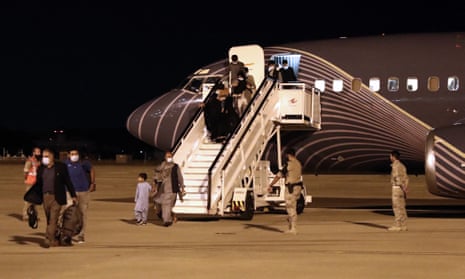Spain has offered itself as the EU’s hub to take in Afghans who have collaborated with its institutions over the years, as Germany said there was an emerging consensus within the bloc to also ease passage for a limited number of other people in need of protection from Taliban reprisals.
However, migration experts warned that the vast majority of Afghan citizens already displaced by the fighting that brought the new regime to power will be left stranded unless European states proactively work to negotiate a safe corridor out of the country.
Western states with a presence in Afghanistan are scrambling to evacuate their own citizens and local Afghan staff amid chaotic scenes at Kabul airport after being caught on the back foot by the Taliban takeover following the withdrawal of US troops.
On top of individual states’ evacuation efforts, the EU’s first flight of Afghan evacuees, organised by the EU’s foreign service, arrived at Madrid’s Torrejón airbase on Thursday with 36 people on board.
“Spain is the port of entry. We host them for a few days and from there they will be distributed to various EU countries,” Spain’s foreign minister, José Manuel Albares, said on Friday.
The first 36 will eventually be settled in Denmark, Germany, Poland and Lithuania, according to Spanish officials.
The UNHCR, the UN’s agency for refugees, says at least 120,000 Afghans have fled from rural areas to Kabul province since the start of the year, but the vast majority of them remain trapped within the country’s borders.
“We are not currently seeing a large exodus of refugees from Afghanistan,” a spokesperson told the Guardian.
Migration experts warned that recent memories of the Syrian refugee crisis in 2015, and a perception that Europe failed to manage it, are preventing European states from coming up with a proactive rescue plan.
“There’s a widely shared misconception at the moment that desperate people cannot be stopped from leaving a country – that’s simply not true if they are pushed back at the border,” said Gerald Knaus, co-founder of the European Stability Initiative (ESI) thinktank.
“In 2021, states are controlling their borders with force and brutality in the way they didn’t in 2015,” he said. Turkey is reinforcing its border with Iran, while Pakistan is on the verge of completing a fence along the border with Afghanistan.
While the main routes into Europe were blocked, Afghan refugees “won’t just arrive spontaneously”, said Knaus. Instead, he urged willing states to negotiate with the Taliban over a safe corridor and resettlement programme for Afghans desperate to leave the country, taking its inspiration from the rescue effort for those fleeing Vietnam after the end of the war in 1975.
Horst Seehofer, the German interior minister, said on Thursday that members of Afghan society “especially deserving of protection”, such as journalists or human rights activists, would in the future not need to apply for asylum to get to Germany but would be treated equally to local staff of German government agencies and be issued with a three-year residence permit.
Speaking after a conference call with EU interior ministers on Thursday, Seehofer said he was convinced “all key states” agreed on the need to ease passage for especially vulnerable people.
But he declined to specify how many people could hope to be assigned such a special status, merely saying “we are not looking at numbers that would turn our immigration policies upside down”.
Britain, by contrast, has said it will specifically take in 20,000 Afghans who are “threatened by the current crisis”, in particular women, girls and religious minorities.
A vast majority of refugees would need to be sheltered in Afghanistan’s neighbouring states, Seehofer said: “The first priority is accommodation in neighbouring countries and the support of states in the region.”
His comments echoed concerns about a replay of the 2015 refugee influx that have been voiced by several European governments this week.
In Austria – which hosts the world’s fourth-largest Afghan diaspora community after Pakistan, Iran and Germany – the government said that the Taliban takeover was no reason to take in more Afghan refugees in the future.
“Illegal immigration that runs through dozens of safe states, where migrants choose a destination country, has to be stopped,” said interior minister Karl Nehammer. “There is no reason why an Afghan citizen should come to Austria now.”
Switzerland, which shelters about 14,500 Afghan refugees, also signalled it was not prepared to take in more than the approximately 230 local Afghan staff and their families.
Greece, which was on the frontline of the migration crisis in 2015, said it did not want to become the entry point into the EU for Afghans fleeing the escalating conflict, and there would need to be a common EU response.
In a televised address, the French president, Emmanuel Macron, said there was an obligation to help those threatened by the Taliban takeover, but that “Europe alone cannot assume the consequences of the current situation”.
Armin Laschet, the leader of Angela Merkel’s Christian Democratic Union and one of the frontrunners to replace her as chancellor, said: “We should not send the signal that Germany can take in everyone in need.”
Three Balkan states – Albania, Kosovo and North Macedonia – have so far committed to specific numbers of Afghan refugees who are to be sheltered in their countries while their visa applications to the US are being processed.
“We have to reject all speculations about possible waves of terrorism or other threats to the state,” said Zoran Zaev, the prime minister of North Macedonia, which has agreed to function as a transit country for 450 Afghan women, students and human rights activists. “It’s a very clear question: to be humane, or not to be.”
